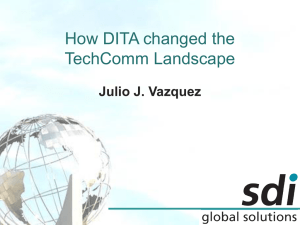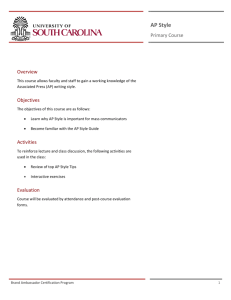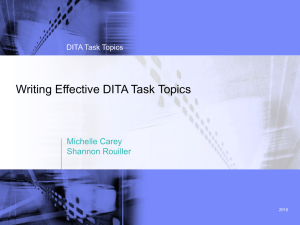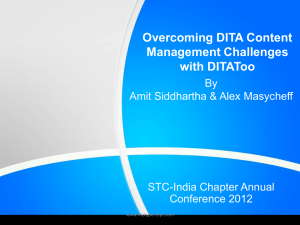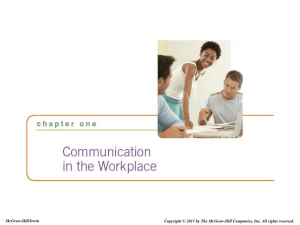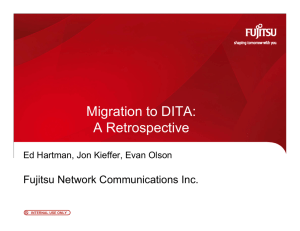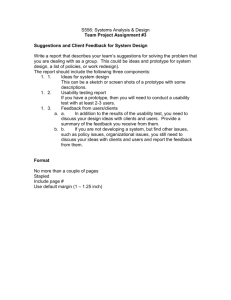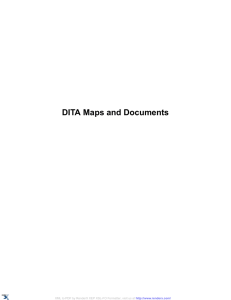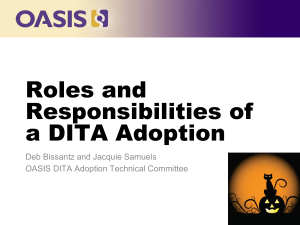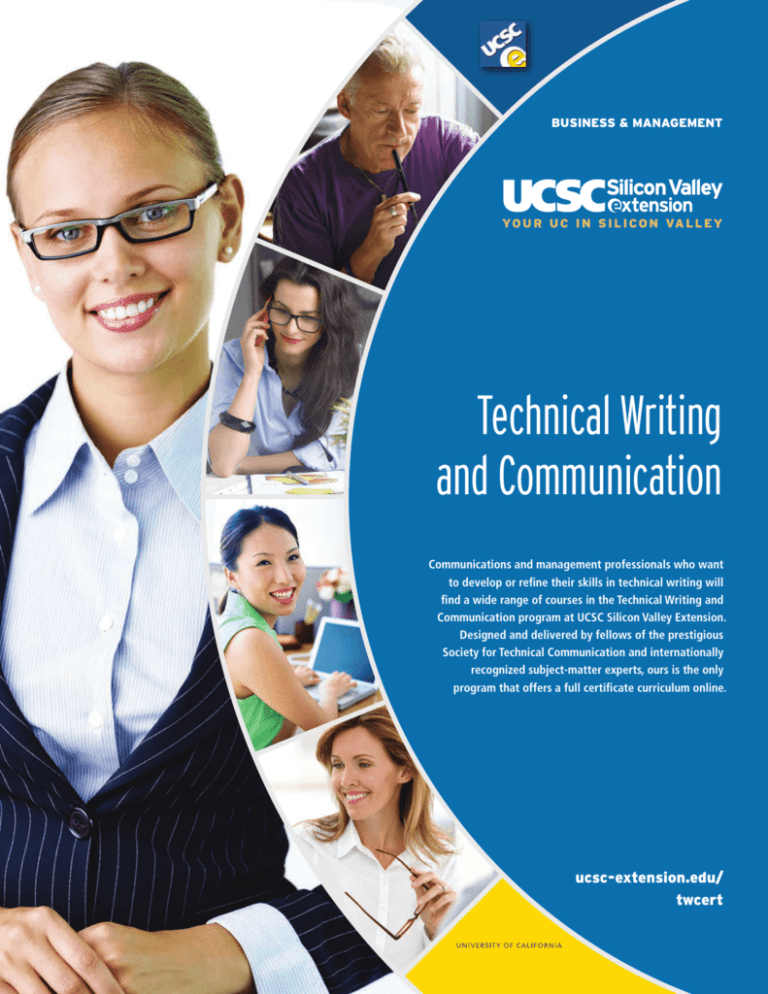
business & Management
yo u r U C i n S i l i c o n Va l l e y
Technical Writing
and Communication
Communications and management professionals who want
to develop or refine their skills in technical writing will
find a wide range of courses in the Technical Writing and
Communication program at UCSC Silicon Valley Extension.
Designed and delivered by fellows of the prestigious
Society for Technical Communication and internationally
recognized subject-matter experts, ours is the only
program that offers a full certificate curriculum online.
ucsc-extension.edu/
twcert
Technical Writing and Communication Certificate
Program Chair
ANDREA L. AMES, M.S., is a senior technical
Certificate Requirements
Curriculum
Total: 10 courses
Required: 7 courses
Elective: 3 courses
Required Courses
GPA: 3.0, with a C or better in all courses.
Timeline: Complete all courses within three years.
Note: Courses completed more than five years
prior to date of certificate issuance cannot be used
to fulfill requirements.
Recommended Course Sequence
It is recommended you start with “Technical
Communication: An Introduction to the Profession.”
You must end with “Final Project: Résumé and
Portfolio Preparation.”
Applying for a Certificate
We encourage you to establish candidacy
in a certificate program early in your studies.
This ensures that curriculum changes subsequent to
receipt of your application will not affect your course
requirements. Candidates will be notified of updates
or special opportunities related to their program.
Certificate applications can be submitted online
at ucsc-extension.edu.
Program Contact
Business and Management Department,
(408) 861-3860 or email
extensionprogram@ucsc.edu
staff member (STSM)
and information experience
UnitsCourse
Technical Communication Fundamentals
Technical Communication:
An Introduction to the Profession................ 1.5.........5931
Grammar and Style for
Technical Communicators............................ 3.0.........4360
Technical Writers’ Workshop........................ 1.0.........2145
Writing Successful Instructions,
Procedures and Policies............................... 1.5.........1931
strategist and architect at IBM.
She specializes in user-centered
information usability, strategy,
architecture, and design. Ms. Ames’ specialty
is architecting and designing information for software user interfaces—such as labels, embedded
instructional text, and hover help—and making
the interfaces deploying that information as easy
Developing Technical Information
from Plan to Completion.............................. 2.0.........1947
to explain as possible before developing traditional
Advanced Topics in Communications
Information Architecture
and Design Basics........................................ 1.5.........2662
level and is in demand as a conference speaker
Final Project: Preparing Your Job Search...... 1.5.........6181
Elective Courses (Choose three)
UnitsCourse
doc­umentation. She teaches at the university
internationally. She is a fellow and past president
(2004–05) of the Society for Technical Communication and a distinguished engineer of the
Association for Computing Machinery.
Content Management.................................. 1.0.........6117
DITA Authoring Introduction........................ 2.0.......20830
DITA Information Architecture..................... 1.5.......21971
Graphic Design Fundamentals..................... 2.0.......20025
Human Factors for
Technical Communicators............................ 1.0.........0092
Managing Technical
Documentation Projects............................... 1.0.........1025
Minimalist Design for Documentation......... 0.5.........3981
Mobile UA.................................................... 1.5.......30049
Role of the Project Manager........................ 1.5.........0306
Usability Testing Documentation................. 1.5.........0684
Visual Communication................................. 1.5.......23090
XML for the Rest of Us................................. 1.0.........3560
Enrollment Information
Visit ucsc-extension.edu/twcert for
the most up-to-date information about
all our courses and programs, including
textbooks, schedules and locations.
Enroll online at ucsc-extension.edu.
Copyright © 2015 The Regents of the University of California. All rights reserved.
Our Business and Management department
provides working professionals with UC-quality
training in 15 disciplines. We are accredited
by WASC’s Commission for Senior Colleges
and Universities, approved by the Chair of the
world-renowned UCSC Economics Department,
and reviewed by an advisory board. To learn
more about our community partnerships,
please visit ucsc-extension.edu/business.
Info
Technical Writing and Communication Info Session
ONLINE
applies to information; what makes information usable; and how to contribute to your company’s success by ensuring information usability.
Course 0469
To learn more, visit ucsc-extension.edu/events
Technical Writer’s Workshop
Required Courses
Technical Communication
Fundamentals
Developing Technical Information
from Plan to Completion
This course introduces technical communication
skills and covers the types of information commonly
produced by technical writers. You’ll learn to integrate
fundamental technical writing strategies with print
and online document design principles to create
effective, audience-appropriate information. You’ll gain
experience writing technical information, analyzing
tasks, negotiating with subject-matter experts, setting
production schedules, and managing multiple projects.
The instructor addresses technical writing strategies
for various types of technical information; appropriate
formats for technical audiences; styles, standards
and design for online and print documents;
and the life cycle of technical writing projects.
Course 1947
Grammar and Style for
Technical Communicators
Advanced Topics in Communications
This course is an introduction to creating short technical
documents, such as reports and correspondence.
Through lecture, exercises, reading and homework,
you’ll practice the basics of good writing, formatting
of technical documents, rhetorical modes, clear,
grammatically correct writing at the sentence and
paragraph levels; appropriate styles for a diverse
technical audience, and punctuating technical
information. The course includes four writing
assignments, which consist of different types
of documents, such as descriptive or instructional
reports. The final project will be portfolio-worthy.
Course 2145
Writing Successful Instructions,
Procedures and Policies
This course focuses on the role of the writer in
eliciting software requirements supporting iterative
development; creating step-by-step instructions suitable for user guides; and writing policies, processes,
and procedures for corporate governance. You’ll
learn via course lectures, discussions, quizzes and
writing assignments specific to these genres.
Course 1931
This course provides an intensive review of modern
English grammar, style, and punctuation, and examines
how these subjects pertain to current technical writing.
We review parts of speech, clauses, phrases, subjects,
and predicates; discuss sentence patterns, forms, and
voice; and review sentence errors such as comma
splices, fragments, pronoun and verb agreement, and
dangling and misplaced modifiers. This course also
examines wordiness, parallelism, and word choice.
Course 4360
Technical Communication:
An Introduction to the Profession
This introductory course first reviews the history
of technical communication, the top 10 indicators
of success, and the roles of technical communicators
in Fortune 500 companies, start-ups, government
labs, and freelance consulting. You’ll also examine
the key technical communications processes, including
information design and development, user-centered
design, and how these processes fit into the product
or research life cycle. The course offers tangible
skills, including how to interview subject-matter
experts and users, define an information set, write
parts of typical documentation, and measure
the work product.
Course 5931
Session
Bring your questions and join us for this free seminar about our renowned program for technical communicators. Learn what usability is and how it
Information Architecture
and Design Basics
This course focuses on data used in information-rich
user interfaces, including multimedia, software
products and interfaces, product help, and websites.
You’ll also learn about the technologies and tools
used to create the underlying infrastructure for online
information. Lectures, demonstrations, discussions
and exercises cover the past, present and future
of online information development. The course
covers the online information development process,
information architecture and design concepts, user
interface and interaction design concepts; Web-based
technologies with an emphasis on HTML; and the
benefits and constraints of technologies related
to online information development.
Course 2662
Final Project: Preparing Your Job Search
This final course in the Technical Writing and
Communication certificate program is designed to
prepare you to secure employment as technical communicators. You’ll develop an industry-appropriate
portfolio and resume that are tailored to the job
market and the type of job desired. You’ll also
learn how to make the most of social networks
and prepare for interviews.
Course 6181
Courses continue on reverse…
Human Factors for
Technical Communicators
Elective Courses
Content Management
In this course, you will learn how to decide whether
your organization needs content management,
what content management might do for you,
and what challenges you could face in moving from
a document-centric world to a complex interactive
system alive with content. Topics include content
inventory, personalization and customization,
best tools, social networks, and collaborative
environments.
Human factors are a fundamental building block
for anyone developing information and products—
especially interactive, online information. This course
provides a grounding in user psychology, including
how people sense and perceive the world around
them; the capabilities and limitations of human
memory; the impact of colors, shapes, and patterns;
various learning styles; and approaches and obstacles
to problem-solving. The course also describes how
these factors impact the information architecture
and design tasks of technical communicators.
Course 0092
Course 6117
DITA Authoring, Introduction
This course covers DITA standard basics, including
topics and maps, guidelines and best practices, and
the building blocks of effective topic-based information.
You’ll learn to produce reusable topics and usable,
user-centered content that can be configured to
meet new product, user, or media requirements.
The course introduces XML basics, topic-based
authoring and DITA content types (concept, task,
reference, and glossary). You’ll learn to create titles,
short descriptions, and content appropriate for each
DITA type; design information deliverables using
maps; and reuse content within a topic or map.
Course 20830
DITA Information Architecture
The value of DITA is expressed in its enforcement
of a topic-based architecture. DITA provides specific
mechanisms, including DITA maps and relationship
tables, that enable information architects to provide
a valuable and usable information experience for their
users. In this course, you’ll learn about the structure
of each of the DITA architecture mechanisms, and
how you can use them to enhance information
delivery for your customers.
Course 21971
Role of the Project Manager
Managing Technical
Documentation Projects
This course equips technical communicators with
the knowledge, tools, and techniques necessary to
develop information and project plans; reasonable,
accurate, and detailed documentation project budgets;
and schedules to meet due dates and control costs.
In addition, you’ll learn to track and close out
projects and manage documentation projects
in Agile environments.
Course 1025
Minimalist Design for Documentation
The minimalist design model, designed by
Dr. John Carroll, holds that computer users learn
more efficiently and use products more successfully
by working more with the system and less with
documentation. This course discusses how minimalist
design principles can be applied to complex technical
documentation and introductory training materials.
You’ll apply minimalist design techniques to online
documentation and Help systems, omit expository
text, create interchangeable modules or chunks,
expect user errors and provide recovery tips.
The course concentrates on user tasks and analyzes
how to shorten documentation and materials
while increasing their effectiveness.
Graphic Design Fundamentals
Course 3981
This course will provide you with the basic skills
used by designers everywhere. You’ll learn to set a
strategy for any given project, ideate via thumbnail
sketches, select appropriate imagery and typeface,
all while keeping the brand and project constraints
in focus. Topics include typography, color theory,
layouts and grids, and image selection. The course
is highly recommended as a foundation for anyone
interested in taking Web design courses.
Course 20025
This course is designed to acquaint you with project
management and the roles that a project manager
plays in the five primary processes involved in
managing projects: writing an effective project plan;
developing successful project schedules; executing
and controlling the project plan; the “triple constraint”
and how it affects the project manager; and understanding project phases and project life cycles.
You’ll learn the life cycle of typical projects and
identify the diverse skills needed to successfully
play these project manager roles.
Course 0306
Usability Testing Documentation
This introductory course describes the user-centered
design process, from analysis through design and
validation, emphasizing where and how usability
testing fits into the development cycle. You’ll complete
a simulation to plan and design a usability test for
validating documents, conduct testing on classmates,
then compile and analyze test results for a class
presentation. Topics include the basic concepts,
terminology, and goals of quality, usability, and
audience analysis; the limitations of usability
testing; understanding users and their needs, tasks,
and environment; and the relationship between
audience analysis data and design decisions.
Course 0684
Visual Communication
The most successful writers employ the principles
of design to communicate information visually in
the documents they create. This course discusses
how visual elements can empower your ability to
communicate effectively, whether you are writing
a multi-page report, procedure document, brochure,
or Web page. You’ll learn when it is appropriate to
transform text into visual elements and how to create
visually pleasing documents that fulfill the document’s
purpose. You’ll also learn about publishing processes
that are critical to working efficiently with in-house
designers and outside printers to create professional
documents.
Mobile UA
Course 23090
Smartphones have spurred the rapid emergence
of a huge new software segment: the mobile
application. User Assistance plays an important
role in supporting mobile apps. This unique course
provides detailed instruction in the design, writing,
tools, and planning of your mobile UA.
Course 30049
XML for the Rest of Us
This course explains why XML has become a Web
standard, how it changes the way you write, and
how to use XML tags effectively. You’ll use a parser
to monitor your tags and ensure accuracy, check
your document structure, and verify that it matches
a Document Type Definition or Schema standard.
Course exercises help you create an XML document,
including a prolog with an XML declaration, comments
and processing instructions, and a body with elements,
attributes, and entity references. You’ll develop
several short XML documents and one complex,
portfolio-worthy XML document.
Course 3560
Not printed or mailed at state expense. 611795-1503-2122 (5/15/15)

